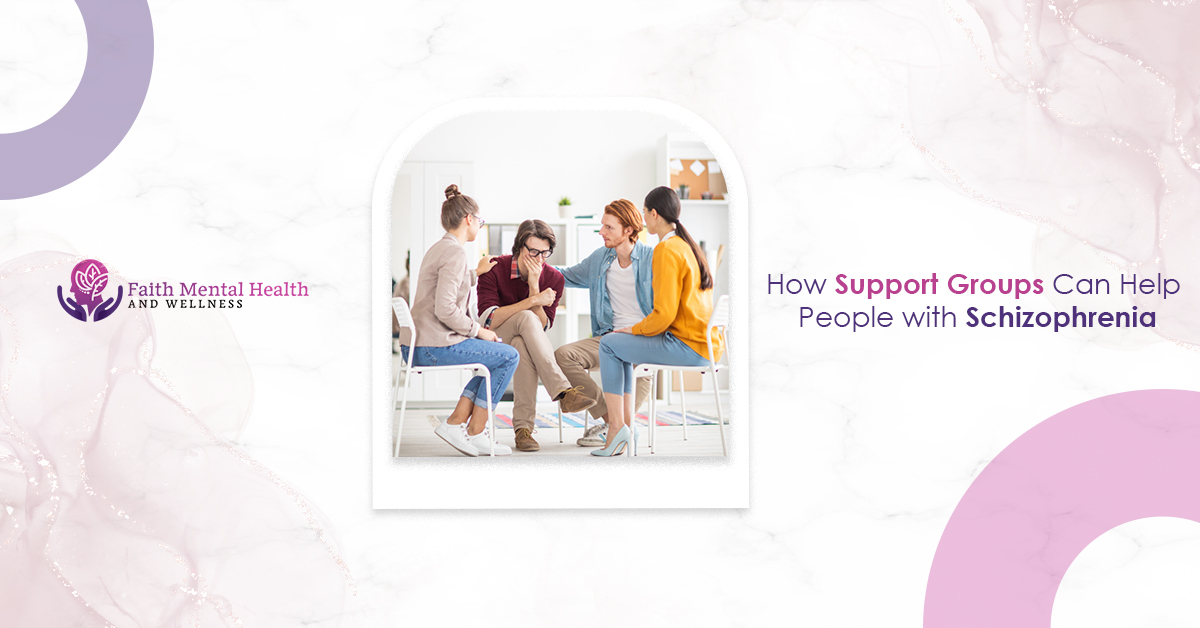Schizophrenia can make you feel alone. Your mind might be chaotic, and you may hear voices that others don’t. It can be hard to discuss this with loved ones who may not fully understand your struggles. This is why support groups matter. At Faith Mental Health and Wellness, we recognize the need to find common ground with those who get it. Let’s explore.
What a Support Group Looks Like
A support group is a small meeting that happens often. A leader, counselor, or trained peer often leads the talk. Each individual gets to speak. Everyone listens and avoids judgment. The goal is simple: share helpful things, express your fears, and find new coping methods.
Why Support Groups Matter
You discover you are not the only one. Hearing others tell their stories reminds you that voices or fears don’t make you weak.
You pick up ideas that work well. Perhaps someone shares a breathing technique that soothes their thoughts. You try it and find it helps when your thoughts whirl.
You practice talking about hard things. Every meeting provides a secure environment for you to express yourself. That builds confidence for doctor visits or family talks.
You make friends who understand. A few friendly faces who “get it” can lift you on tough days.
Key Benefits, Broken Down
Less “Me vs. Schizophrenia”
- When you feel alone, it’s easy to think, “Nobody else has this.” In a group, you hear many voices echoing your experience. That alone cuts through shame and fear.
Real Tips from Real People
- Professionals teach a lot. But hearing a peer say, “I did this and it worked for me” feels more real. It’s a living guide, not just a pamphlet.
A Practice Ground for Communication
- Sharing in front of others, even if it’s just one sentence, helps you find your words. In your next conversation with your doctor or a friend, you’ll be more equipped.
A Sense of Belonging
- Schizophrenia can make you feel cut off. A group brings you back into the community. You belong somewhere. You matter.
How We Help You at Faith Mental Health and Wellness
At Faith Mental Health and Wellness, we want you to feel secure and valued. First, we listen to your story and any concerns you may have. Then, Faith Sapit and our team make a plan just for you. We give you medicine, simple calm-down tips, and friendly talk time. We meet often to see how you feel and change things if you need to. You are never alone with your schizophrenia.
What Your Treatment Includes
- Medication to keep your mind steady.
- Focus on your breath and grounding techniques.
- Hold individual talks to share your thoughts and feelings.
- Check and tweak these methods often to see how well they work.
- Assistance in joining local groups and fun activities.
Inside a Typical Support Group Session
- Check in. Each person says how they feel using simple words or pictures. You might point to a smiley face or choose “happy,” “sad,” “scared,” or “calm.”
- Story time. One person shares a recent challenge: a bad day with loud voices or a sleepless night. The rest listen quietly.
- Idea swap. The leader asks, “What helped you when you felt like that?” Members suggest breathing, writing, calling a friend, or listening to music.
- Skill practice. The leader teaches a short exercise, maybe deep breathing or grounding your senses. You try it together.
- Goal setting. Everyone names one small thing to try before the next meeting. It could be as simple as stepping outside for two minutes or noting which thoughts pop up most.
How to Find the Right Group
- Talk to us. We will discuss your timetable, your level of comfort, and what you aim to accomplish.
- Try a session. You are welcome to join a meeting just to observe. No pressure to speak until you’re ready.
- Switch if needed. If one group doesn’t feel like you fit, we’ll help you try another.
- Keep going. Give it a few sessions. Trust builds over time, and change often arrives in small steps.
Tips for Getting the Most Out of a Group
- Be yourself. Honest sharing opens the door to real help.
- Try suggestions. Even if an idea feels odd at first, give it a fair shot.
- Be patient. Some weeks, you’ll feel more progress than others. That’s okay.
- Reach out between meetings. If you struggle, call a friend from the group or your counselor. You can proceed without waiting for the next session.
What This Really Means
Support groups aren’t quick fixes. They provide something valuable: the reminder that people care. You can discover new coping skills. These groups offer a secure environment for practicing and building connections. You’ll meet friends who get you. Over time, you might feel less scared and more in control.
A Safe Place to Grow
At Faith Mental Health and Wellness, we pledge a secure and supportive environment. We aim to help you build relationships and discover meaning. Connecting with those who understand your path brings both hope and resilience. It also creates new ways to manage life with schizophrenia.
Ready to take the next step? Join us today! A support group can make you feel more connected and introduce new opportunities.
FAQs
Q. How will it help me?
You learn small tricks to calm your mind. You also make caring friends who understand.
Q. How often do groups meet?
Most meet one time each week. Each meeting is about one hour long.
Q. How do I join?
Call Faith Mental Health and Wellness. We will support you in locating a group that aligns with your interests.

